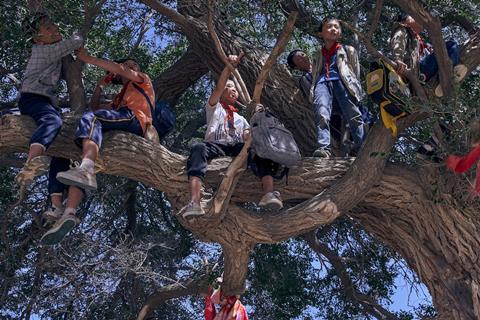Wang Xiaoshuai’s latest is a haunting parable of a disappearing rural China

Dir/scr: Wang Xiaoshuai. China/Netherlands. 2024. 123mins
A young boy in a remote Chinese mountain village desperately wants a water pistol, just like the ones his schoolfriends have. After long trials and tribulations, he gets it. But, by that time, there is no school and no-one left in the village to play with. In sixth generation director Wang Xiaoshuai’s bittersweet adaptation of a short story by Li Shijiang, this sliver of a tale grows into a resonant parable of what China has lost in its drive for modernisation.
Tender, engaging story of rural displacement
With its focus on headstrong ten-year-old hero Wo Tu (whose name gives the film its Chinese title) and its magical realist dream-structure, Above The Dust can easily be read as a children’s film of sorts – which would explain why it surfaced in Berlin’s Generation section. Like Abbas Kiarostami’s 1987 breakout film Where Is The Friend’s House?, Wang uses one country boy’s stubborn, single-minded quest to smuggle in some grown-up meditations on the fragility of a rural landscape and its distracted inhabitants.
The director considers Above The Dust to be the second part of his ‘Homeland Trilogy’ after his poignant 2019 ‘one child policy’ drama So Long, My Son. But this is a very different film from that epic with its tough dramatic core and daring temporal leaps. Here, Wang’s touch is lighter, sometimes a little broader and cruder too, in a family drama that can also be read as an extended parable. There will be a few committed cineastes out there who are eagerly waiting for part two of Wang’s trilogy, but mostly this tender, engaging story of rural displacement seems destined to forge its own, independent arthouse path.
Shot on location in the northwestern province of Gansu, on the border with Mongolia, amid terraced hills whose bare, stubbly contours tell a tale of deforestation and desertification, Above The Dust opens in the dust, as young Wo Tu (a feisty performance from Ouyang Wenxin) drags a bucket of water home through a sandstorm. He lives with his mother Muyue (Yong Mei), his little sister and his moribund grandpa (Li Jun) in a rural farmstead. Dad Chuan (Zu Feng) is away working on a construction project in the city.
Only an emergency like grandpa’s death will bring Chuan back – but when that happens, he returns without the water pistol, much to Wo Tu’s disgust. Adults are distracted, especially breadwinners like Chuan who, in the murky economic backwaters of the new China, will not even get paid until the building he is constructing is finished. But grandpa foresaw all this. Before he departed, he told his grandson that if he looks after his grave and performs the traditional rites, he’ll return as a ghost, bringing that coveted aqueous weapon.
What he didn’t mention is that he would haunt Wo Tu’s dreams, not his waking life: and however tangible a gift is in a dream, you cannot take it to school with you the next day. Wang’s smart intuition is that the incompatibility of these two worlds, the real and the oneiric, can become a supple, subtle metaphor for a traumatic fracture in the history of this rural province and the nation at large. The metaphor is given flesh once grandpa – a twinkly turn by Li Jun – begins to dream-guide his grandson through what happened in the village in the early years of the People’s Republic when, at the height of the push for land distribution to the peasantry, he denounced his own landowner father.
Two great set pieces combine in ironic resonance: the first, a giant water pistol that the dreaming Wo Tu sees gliding by in a river; the second a rudimentary collective iron smelting furnace – designed to recycle old agricultural tools – that grandpa remembers, or maybe dreams up, from the misty Maoist past. Both, it is suggested, are equally absurd in a land where water is scarce, and growing apricots makes more sense than forging steel.
Now a sixth-generation veteran, the rebel director who first made a splash with Beijing Bicycle in 2001 seems to have reached a point in his career where character matters as much to him as issues. Paradoxically, this makes the issues more trenchant. Yong Mei, who won the Best Actress award at the 2019 Berlinale for her performance in So Long, My Son, is once again terrific as a woman cornered by circumstance who gradually replaces her flaccid husband as the brains and provider of the family.
Above The Dust paints a sympathetic, involving picture of a family struggling, and failing, to hold on to a place, and the values associated with it: burial rather than cremation, a lingering affection for the old gods, the idea that your house and land might actually belong to you, rather than a Party whose idea of respecting local values is to create a whole suburb of cookie-cutter ‘traditional houses’ on the edge of the city. Perhaps the neatest detail in a film that paints a dying rural community with affectionate, handheld naturalism are all the old folk we see on verges and street corners, watching the world go by. We never really work out if they are there, if they are dreamed, or if they are fellow dreamers.
Production companies: Dongchun Films, Lemming Film
International sales: The Match Factory, info@matchfactory.de
Producer: Liu Xuan
Screenplay: Wang Xiaoshuai, based on a short story by Li Shijiang
Cinematography: Kim Hyunseok
Production design: Lu Dong
Editing: Ruben van der Hammen
Music: Juho Nurmel, Ella van der Woude
Cast: Ouyang Wenxin, Yong Mei, Zu Feng, Li Jun, Wang Zichuan, Zhao Xiaoning
























